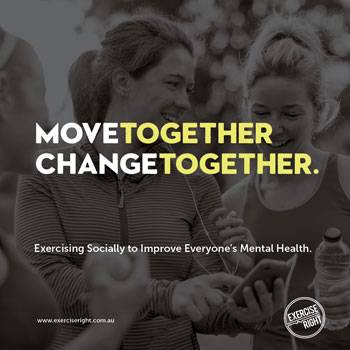Move Together - Change Together

Exercising Socially to Improve Everyone's Mental Health
With 1 in 5 Australians experiencing poor mental well-being each year, October marks a significant month for mental health, with both Queensland's Mental Health Week, 8-14 October, and World Mental Health Day, 10 October, campaigning to raise nation-wide awareness and reduce the associated stigma that mental illnesses carry.
With the benefits of exercise on both physical and mental health becoming more clear, Exercise & Sports Science Australia (ESSA) is continuing to promote these benefits of physical activity on mental health by launching their latest campaign, -MOVE TOGETHER – CHANGE TOGETHER'.
'With 20% of Australians living with a mental health condition, this campaign by ESSA is to remind Australians that exercise isn't just about improving your physical health and fitness, it is also has profound effects on your mental health and well-being," says Anita Hobson-Powell, ESSA Chief Executive Officer.
The MOVE TOGETHER – CHANGE TOGETHER campaign highlights the benefits that exercising socially can have for people living with mental health conditions and also their support network who have noticed the positive effects exercise has had on their loved one, friend or client.
Accredited Exercise Physiologists (AEPs) are qualified to prescribe exercise to a range of clients living with chronic conditions, such as a mental illness. Clients of AEPs living with a mental illness kindly provided ESSA with feedback on what they've encountered when engaging socially in physical activity:
'Exercising allowed me to manage my struggling mental health, and was one of the best treatments I could start. But the ability to run alongside others, and have every day chit chat about life and how we are coping, that's been the best dose of medicine I could ask for, for all of my symptoms," shares an anonymous 35-year-old male with a diagnosis of PTSD, anxiety and depression.
"Exercise helps distract my mind from my problems throughout the class. By the end of the session I feel physically better which also helps my mind feel better too. Group classes help me to mix socially, without the need for intense interaction (like therapy groups). Having all the regulars in makes the class feel safe, all the small talk helps to build my esteem," commented an anonymous 61-year-old male also with a diagnosis of PTSD, anxiety and depression.
Dr Simon Rosenbaum, leading mental health and exercise researcher and Senior Research Fellow at UNSW Sydney and Black Dog Institute, explains further the benefits exercising socially has on our mental health.
'We see with campaigns like R U OK Day and World Mental Health Day how people are willing to connect and engage in meaningful conversations about mental health. Exercise can provide an ideal opportunity for these conversations to happen in a non-confrontational, de-stigmatising way, while also helping to improve each other's mental and physical well-being."
If you know someone who lives with a mental health condition, consider incorporating some regular physical activity in to your catch ups. It's important to take the first step, as we all have room to improve our well-being.
'This could be a weekly walk, or a workout date, where you're making time to check in with how someone is going with their treatment, or perhaps if they're in need of some extra support," adds Dr Rosenbaum.
The father of a 23-year-old son living with a diagnosis of PTSD and depression spoke with ESSA about the benefits he has seen firsthand from exercising with his son.
'Taking the time to exercise and go to yoga classes and go for jogs around the block with my son not only helps to manage his mental health, but it strengthens our relationship and bond, and in turn, my own mental and physical health."
An anonymous 23-year-old female with a diagnosis of OCD and first episode psychosis also shared how exercising in a group setting with an AEP taught her how to be comfortable with people again.
'Due to the psychosis, I didn't have a lot of trust and was quite paranoid around others. Being in a group showed me that people want the best for me and to push me to achieve better things."
'It's great to exercise with someone who's written the exercise program for everyone. It was easy for me to make excuses to go easy on myself and skip exercises when I was exercising by myself, especially when my motivation was low. But having someone there to encourage me to keep exercising made me exercise a lot more consistently and reap the benefits."
It's important to consult the right exercise professional prior to undertaking any physical activity. By consulting an Accredited Exercise Physiologist, you will be working with someone who cares about your well-being, understands the challenges you face with your mental illness and who has the skills and knowledge to help you manage your condition.
To find out more about exercising right for your mental health, visit the Exercise Right website.
To contact your local accredited exercise professional, visit the ESSA website.
MORE





